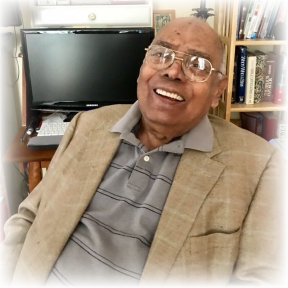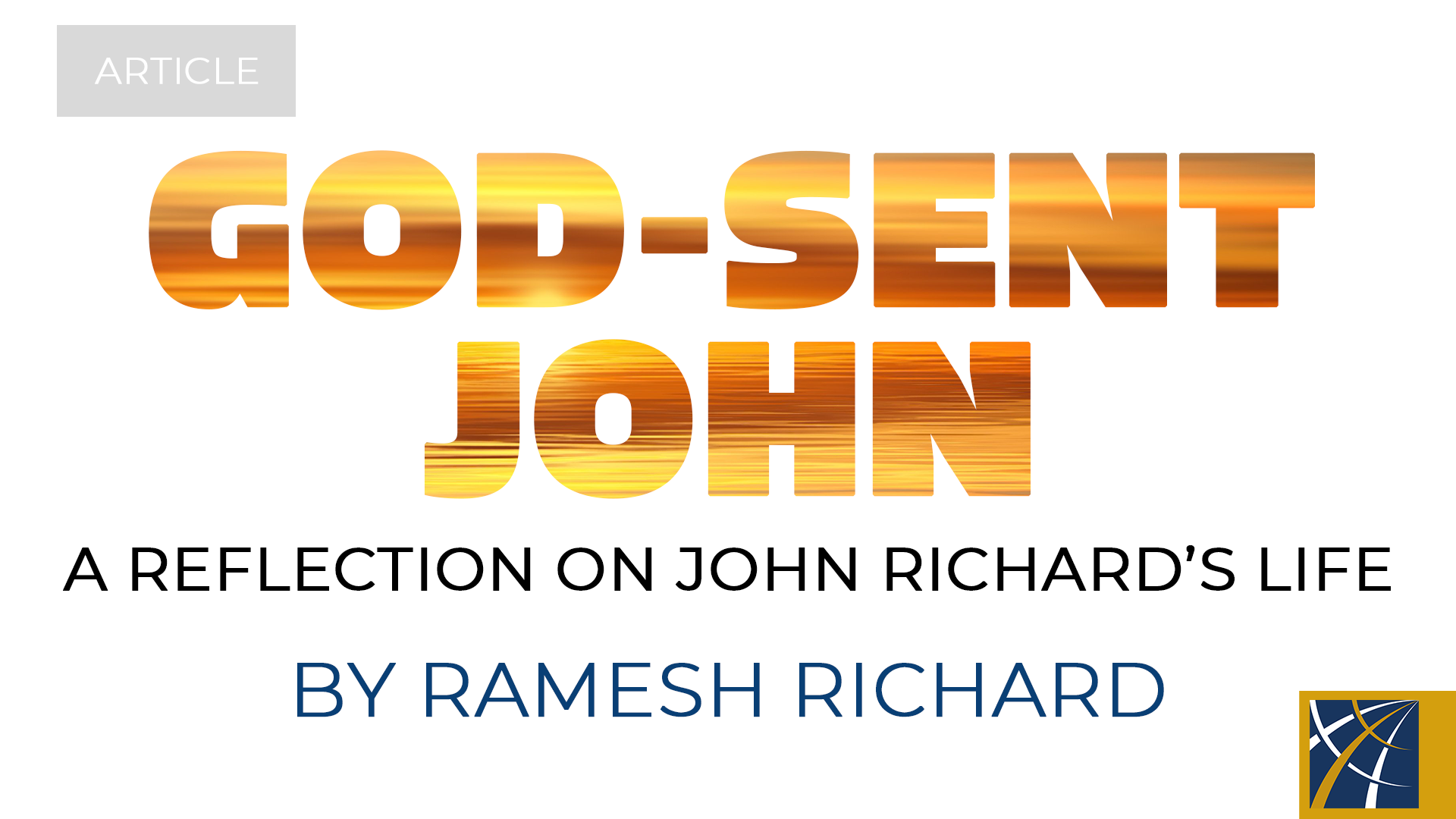
*Ramesh Richard
by Ramesh Richard
“There was a man sent from God, whose name was John.” Upon this important occasion of bidding a temporary farewell to my father, allow me to stretch that introduction of John the Baptizer in John 1:6 into a description of John Richard. The latter entered his heavenly reward for his earthly labor 17 days short of his 95th birthday (February 20, 1923 – February 3, 2018). Unlike the Baptizer’s horrific martyrdom, my father’s life was long and fruitful. Nevertheless, certain characteristics of John the Baptizer easily and beautifully apply to my beloved dad.
A God-Sent Man
“There was a man sent from God…”
“Which God?” one may ask. The answer is found in the preceding verses (Jn 1:1–3). A definite God and not a mere generic idea, a personal Being qualitatively different from the rest of the created order—this is the God who sent John. This One—the Word—who was with God and was God, and who brought all reality into existence (v. 1), He became flesh and dwelt among us (v. 14). God, the Word, long of grace and truth, this One was Jesus Christ (v. 18). This is the living God, the God of all life and light (v. 4) who sent John.
Being sent by God made John the Baptizer specific and strategic in his assignment.
My dad sensed this divine “sent-ness,” too. He represented the living God through his life and word, in his principles and practices of the light rather than darkness. Humility, love, wisdom, contentment and generosity characterized him. His immediate family and many others experienced his godly practices firsthand.
He immersed himself in God’s Word. As a young lad, I remember finding him daily in the rickety easy chair on our verandah with pen in hand, underlining his Bible. I failed to find any unmarked pages when I would thumb through it. By the time he finished his earthly life, he had read the entire Bible 33 times!
The practice of precise, focused, believing prayer was ingrained into his schedule as part of daily work. He declined long phone conversations with kids or grandkids because he had “to get back to work”—the work of prayer. And we all know prayer is work. It is not even a week since his passing as I write this reflection. Yet, along with missing his thoughtful and timely encouragement to pursue God and His will, we already have started missing him telling us that he is praying daily for us.
He was a God-sent man, sent by the living and loving God of all creation and salvation, sent as a man with a purpose, a man on a mission.
A God-Sent Mission
“He [John the Baptizer] came for a witness, that he might bear witness of the light” (Jn 1:7).
John Richard was on a God-sent mission to bear witness to the Light by means of a morally winsome life. He was fond of quoting and meeting the challenge of Nobel laureate Rabindranath Tagore to Christians: “On that day when we see Christ living out His life in you, then on that day we Hindus will flock to your Christ even as doves flock to their feeding ground.”
In fact, in my early years I wondered if he sinned at all. His airline colleagues teased him that if stranded on an island with the actress Gina Lollobrigida and the Bible, they knew John would be reading his Bible!
However, he didn’t think his life alone was enough to share the full content of his relationship with God. He also testified to the Light with verbal witness. Like John the Baptizer, he would serve only as a pointer to the One who had been explicitly forecast and anticipated for 2,000 years. He would be simply the voice (v. 34), not the Christ. As his mission, he brought news of God’s salvation.
The week prior to my father’s death, I had the privilege of participating in the first National Missions Consultation of about 180 organizations drawn from across India. Many specifically asked about his welfare; one asked only about my father without even greeting me. Another leader wrote, “John Richard had given critical leadership to the founding of what would become the largest missions association in the world.” I reveled in my father’s national missions influence, personally and organizationally, not knowing that he would be gone from us the following week.
He traveled frequently to dozens of lands in various capacities as leader, teacher, facilitator and reconciler. Manorama, his faithful wife of 64 years, would tease him as “always planning on the next trip before he got back from this one!” And yet, once she became rather dependent on him, he changed his entire pattern of living to dedicate himself to the wife of his youth. This reprioritization did not escape the observation of his children and grandchildren.
I remember him, on his God-sent mission, making the plea in Seoul for the establishment of a continent-wide body for evangelical Christians. While many nations in Asia were represented by their own deputations, a commission to represent evangelical convictions and causes across the burgeoning and dynamic continent would be critical for the future. That organization was established and continues its representational role today.

John Richard
When I was not sure of what my next steps would be in the launching of an international coalition for pastoral trainers, he advised me to get the heads of 99 organizations on their knees to seek God’s direction. And if we had a good response, we would have them vote on eight persons to comprise a continuation committee to further the immediate next steps. That spiritual wisdom still sustains our efforts.
Yet, he kindly but firmly refused to travel to Bangkok in 2016 for RREACH’s historic global congress for pastoral trainers because it could be “a distraction from the purpose.” He said, “Too many will pay attention to assisting me rather than to the program!” So, instead, we prerecorded his closing prayer for the nearly three thousand trainers of pastors from over 100 countries. Having coordinated many such international events and knowing what it takes, he praised God for its successful execution, prayed for the travel mercies for delegates from all the continents, and for efficient follow-up. His prayers were all answered. And indeed, seeing his face on the screens, several thought he had been there and sent regrets for not meeting with him at the event. John Richard was right. He would have been a distraction rather than a contribution. He wanted glory to go to His Christ alone while fulfilling his mission by life and word.
A God-Sent Message
“Behold the Lamb of God who takes away the sin of the world” (Jn 1:29).
John born of Zechariah and Elizabeth, the first-century model, and John born of S. David Pillai and Nesammal, the twenty-first-century mimic, both knew that they could not but proclaim the life-saving message of Jesus the Messiah.
“Lamb of God” imagery reverberates throughout salvation history to capture Jesus’ unique and ultimate sacrifice to take away the sins of the world. Animal sacrifice covered the transgression of one couple in the Garden, covered each family at the Jewish Passover, and covered an entire nation at the Day of Atonement. Finally, for all: the Lord Jesus is the sacrificial lamb for the sins of the entire world. Add, and multiply, the sins of all who live now, who have ever lived, and all who will ever live anywhere and everywhere, and the divine and sinless Lamb covers it all. Humanity becomes savable through faith alone in the Lamb, the Lord Jesus Christ.
Now, for all who would place their trust in the Lamb of God, there is deliverance from eternal hell and righteous forgiveness of all our sins. Even as both Johns decreased in significance so that Jesus might increase in His (3:30), they did not fail to deliver this message about Jesus’ salvation for all humanity with humility and clarity. When the Baptizer’s disciples heard him speak, they followed Jesus (1:37). So, too, with my dad.
John Richard’s internationally-known pastor considered him as “older brother, confidant and mentor” and used powerful imagery to capture his role: “While everything on the outside was going well, I was facing some of the darkest days of my life. Brother John Richard was a shining light to me.” One of our Lord’s testimonies of John the Baptizer was similar: “He was the lamp that was burning and was shining and you were willing to rejoice for a while in his light” (5:35).
This week of my dad’s death, I started reading his book Five Smooth Stones for the first time. A rationale for this delay? Why read the book as long as we have the author around? In it, I can hear his preaching voice speaking about anyone “being sent”:
A “sent” messenger is from God. In saying: [I] am “sent,” he declares that he has no authority of his own. He himself is under authority … He is just a relay station, bringing a message from God, the Originator of all good news. … He is yet another bondservant. … A “sent” messenger has nothing to glory of, save in God who has commissioned him. (p. 50)
The outpouring this week of hundreds of personal testimonies puts courage and comfort in his children, grandchildren and great-grandchildren; we all together were willing to rejoice for a while in John Richard’s light. Now as long as we are in the world, by the charge of our Savior, we shall be lights in the world. Just like our father, grandfather and great-grandfather, we want to be a God-sent “man,” on a God-sent mission, with a God-sent message.
*Ramesh Richard, the oldest of John and Manorama Richard’s four children, serves as a proclaimer of God’s Word globally through RREACH and as a professor at Dallas Seminary.






